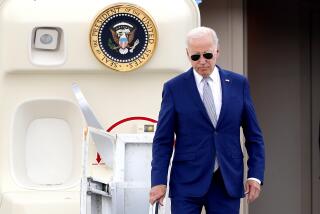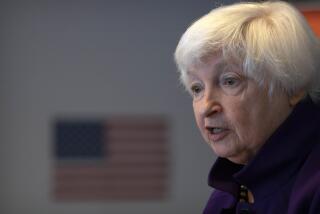China’s Premier Off to India, Seeks Warmer Ties
- Share via
BEIJING — Chinese Premier Li Peng left here today for a six-day visit to India aimed at boosting bilateral ties and further easing the lingering rancor left from a 1962 border war.
China and India, the world’s two most populous countries, are likely to mark the visit by calling for a stronger voice in international affairs for the world’s poorer nations.
Speaking to reporters before his departure, Li noted that his trip comes as dramatic events unfold in the Soviet Union and Eastern Europe.
“Those changes have not served the interests of achieving world peace and stability,” Li asserted. “We are now seeing great chaos, and the situation is unpredictable. It is against this background that I’m going to pay this visit to India. I think it is good for our two big neighboring countries to increase our mutual understanding and strengthen our cooperation.”
In a reference to colonialism and foreign aggression, Li said the two countries “shared the same bitter historical experiences.” He also noted that their combined population is nearly 2 billion.
During the 1950s, India’s Prime Minister Jawaharlal Nehru and China’s Premier Chou En-lai forged warm Sino-Indian relations based largely on opposition to big-power interference in the affairs of other countries.
But that friendship was shattered when the countries clashed in 1962 over border disputes in the Himalayan region. India claims land held by China in southwestern Xinjiang and western Tibet along the Kashmir border; China claims land that is part of northeastern India.
A border agreement based on the status quo has long been favored by Beijing, but public opinion in India has demanded that any settlement must transfer to India large areas now controlled by China.
Li’s visit to New Delhi for meetings with Prime Minister P. V. Narasimha Rao and other Indian leaders will be the first by a Chinese premier since Chou went there in 1960. The late Indian Prime Minister Rajiv Gandhi visited Beijing three years ago in a key step for Sino-Indian rapprochement. The two countries then opened the door to expanded contacts by agreeing to increase trade and other contacts without linking these issues to the border question.
In recent remarks quoted by the official New China News Agency, Li said that “both sides need to make certain concessions” on borders. But he suggested that China is unlikely to yield much. Pending a resolution of the border issue, both sides should “abide by the border lines of actual control,” Li said.
A key Chinese goal for Li’s visit is to press the idea that any new world order must be based on equality between nations and non-interference in the internal affairs of other countries. Beijing fears that the United States, Western Europe and Japan are trying to establish a world system dominated by wealthy, industrialized democracies.
India seems likely to support this message. Even in 1989, New Delhi refused to join international condemnation of China for the army massacre of pro-democracy protesters in Beijing, citing the principle of non-interference in the internal affairs of other countries. China and India share the view that developing nations should have more weight in international affairs.
Li’s visit may be marked by anti-Chinese protests staged by Tibetan refugees in India. Tibet, part of the Chinese empire during the Qing Dynasty, had de facto independence from 1911 to 1951, when Beijing established Chinese Communist control. Since 1987, anti-Chinese protests in Tibet’s capital of Lhasa have been violently suppressed, and tensions in the region remain high.
An unnamed Indian official quoted by the British news agency Reuters said that plans for Li to visit the famous Taj Mahal had been canceled “for security reasons.” The change was requested by the Chinese, this official said. “We have received several letters from local Tibetan groups,” explained an anonymous Chinese official quoted by Reuters. “Some have even threatened to assassinate Premier Li during this visit. We are taking it all very seriously.”
Tibet’s exiled religious leader, the Dalai Lama, said last week in Oslo that he will be in New Delhi at the same time as Li. The Dalai Lama said he has explored the possibility of meeting with Li but the Chinese rejected the idea.
More to Read
Sign up for Essential California
The most important California stories and recommendations in your inbox every morning.
You may occasionally receive promotional content from the Los Angeles Times.













